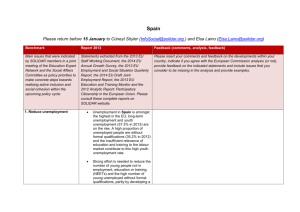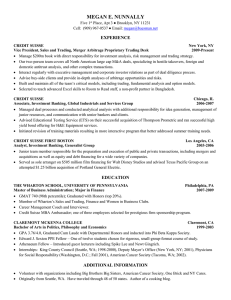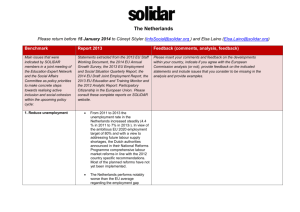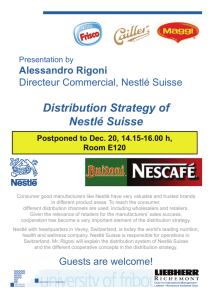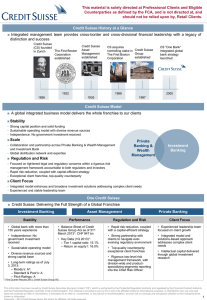- Solidar Suisse Global Xchange Space
advertisement
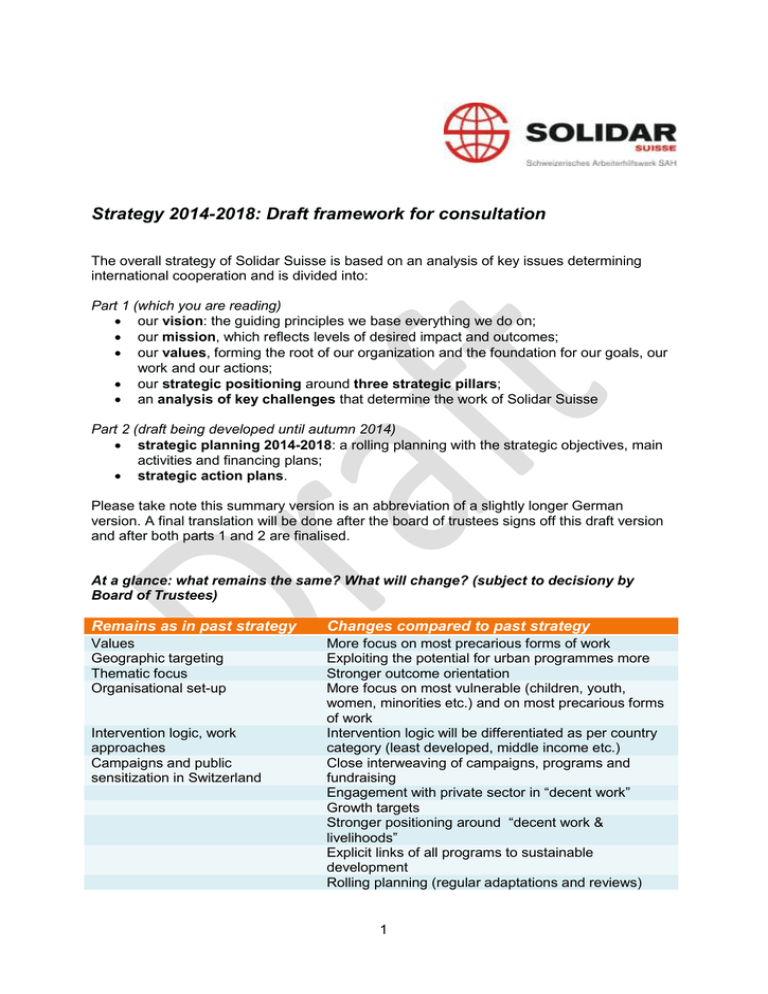
Strategy 2014-2018: Draft framework for consultation The overall strategy of Solidar Suisse is based on an analysis of key issues determining international cooperation and is divided into: Part 1 (which you are reading) our vision: the guiding principles we base everything we do on; our mission, which reflects levels of desired impact and outcomes; our values, forming the root of our organization and the foundation for our goals, our work and our actions; our strategic positioning around three strategic pillars; an analysis of key challenges that determine the work of Solidar Suisse Part 2 (draft being developed until autumn 2014) strategic planning 2014-2018: a rolling planning with the strategic objectives, main activities and financing plans; strategic action plans. Please take note this summary version is an abbreviation of a slightly longer German version. A final translation will be done after the board of trustees signs off this draft version and after both parts 1 and 2 are finalised. At a glance: what remains the same? What will change? (subject to decisiony by Board of Trustees) Remains as in past strategy Changes compared to past strategy Values Geographic targeting Thematic focus Organisational set-up More focus on most precarious forms of work Exploiting the potential for urban programmes more Stronger outcome orientation More focus on most vulnerable (children, youth, women, minorities etc.) and on most precarious forms of work Intervention logic will be differentiated as per country category (least developed, middle income etc.) Close interweaving of campaigns, programs and fundraising Engagement with private sector in “decent work” Growth targets Stronger positioning around “decent work & livelihoods” Explicit links of all programs to sustainable development Rolling planning (regular adaptations and reviews) Intervention logic, work approaches Campaigns and public sensitization in Switzerland 1 1. Our vision and mission Our Vision We live in a world with decent work, social justice and sustainable livelihoods and free of poverty: all people are able to exercise their right to an independent life in dignity. Solidar Suisse contributes to and positions itself in Switzerland as a premier destination for decent work in developing countries and emerging economies. Our Mission Solidar Suisse fights for global social justice and against exploitation. We are committed to supporting sustainable livelihoods both of today’s and of and future generations. Our values Humanitarian Aid Democracy and participation Our strategic orientation Decent Work and livelihoods Decent working conditions, just distribution of resources and services and democratic participation for all are at the heart of the commitment of Solidar Suisse. Respect for human rights and human dignity Rule of law and democratic rights Global solidarity Equal rights and opportunities Solidar Suisse is geared to the needs and rights of the most disadvantaged with development programs in least developed countries (Africa) and in middle-income countries with distinct socio-economic inequalities (South Africa, Latin America, Asia and Eastern Europe). We are working with people in poverty or facing social exclusion who wish to improve their economic, social and political situation. We support efforts to build effective civil society organizations. We engage in humanitarian aid during and after disasters in disadvantaged regions. We combine measures of immediate emergency relief with a mid- and long-term recovery, rehabilitation and reconstruction perspective. This includes the strengthening of civil society and practical prevention measures to reduce both risk and impact of future disasters. Solidar Suisse supports programs that promote the active involvement of civil society in political processes. Citizens and their collective organizations will be encouraged to assume their role in society actively and responsibly, thus contributing to a legitimate democratic society. In our priority topic "decent work" we build solid technical expertise, and document our experience abroad and in Switzerland. Solidar Suisse seeks dialogue with 2 authorities and with the private sector to promote the implementation of the Decent Work Agenda. Our programs will focus on precarious work - special attention will be given to those people who are most affected by exploitation: Children who do not have access to school because of their work obligation; People who are victims of slavery, debt bondage and forced labor and other drastic examples. In our focus countries, we run local coordination offices, and thus ensure that all programs strongly root in the countries of operation. Solidar Suisse is working closely with local partners: civil society organizations, community based organizations, trade unions and non-governmental organisations. We respect their ability and responsibility to be active and effective agents of their own development. We develop all our projects together with stakeholders in participatory processes. In Switzerland, Solidar Suisse is committed to raise awareness on development and poverty issues: Our campaigns are based on real and tangible experience in our programs and aim to trigger individual and collective action in Switzerland in accordance with Agenda 21. Together with our member organizations, our network partners and other development organizations, we see ourselves as advocates for the disadvantaged. Solidar Suisse will actively engage against foreign policy decisions which are based on one-sided national and economic interests. We investigate, raise awareness and use all available channels to influence the decisions of governments at local, regional and national level in favor of global social justice. As a learning organization we are self-critical, maintain an open feedback culture and orient ourselves by best practices. We work according to international standards with regard to quality and transparency: We carefully handle funds entrusted to us and we inform donors and the public about the allocation and use of these funds in a transparent manner. We evaluate our work internally and externally and work in cooperation with local and Swiss universities. We inform the public about the outcomes and impact we achieve with our projects. 2. Our Values Human rights are non-negotiable. Solidar Suisse supports people and communities to safeguard human dignity: we fight against exploitation (child labor, slavery, debt bondage and forced labor), but also against the lack of legal, social and employment protection through our projects abroad and our campaigns in Switzerland. We raise public awareness and sensitize political leaders and we are committed to coherence and consistency in Swiss foreign policy. The rule of law and democratic rights are the foundation of any sustainable development: a self-determined life is only possible if the equitable distribution of resources, goods, services and opportunities, as well as democratic participation are guaranteed. Globalized solidarity is our program: We support our partner organizations and the people in our focus countries in their efforts to lead self-determined lives. Our own individual and collective behavior needs to be based on solidarity. Solidarity with the future generation forces us to a careful handling of the Earth’s resources which serve as a basis for future survival and prosperity. Equality is our commitment: There are no human rights without equality between men and women, girls and boys. The greatest gender inequality is often most prevalent among the poorest, who in turn also suffer the most under gender discrimination. The equality of the sexes and their self-determined and self-evident inclusion in all aspects of life does not happen intuitively, but must be learned in every culture. 3 3. Global challenges for international cooperation The first chapter of the new Solidar strategy describes the following key issues that will shape our work in the coming years: 1) Precarious work - the downside of globalisation The lack of decent work will dominate the lives of all in Solidars countries of intervention. Precarious work is the norm not the exception. Solidar Suisse will step up its work to combat precarious jobs and support decent work. The focus should further be sharpened on the most vulnerable and the most drastic examples of exploitation (youth, children, women, minorities, poorest etc.). The institutional knowledge on decent work and forced labour / modern slavery must be deepened within the organization. The ILO's Decent Work Agenda, the UN Social Charter serve (International Covenant on Economic, Social and Cultural Rights) and the Charter of Human Rights (Universal Declaration of Human Rights) serve as guidelines for developing contextualized programs that make a contribution to improving the working and living conditions of affected populations. 2) Rule of law, civil societies and democratic involvement Active citizen participation in its various forms and manifestations, is the best basis for sustainable development: A self-determined life in dignity for all, an equitable distribution of opportunities, democracy and rule of law are demonstrably the most effective means to combat poverty and exploitation. By promoting active inclusion of civil society in policymaking at all levels of a state Solidar Suisse can contribute to the strengthening of key actors: By empowering them to assume a strong and active role in society and to exercise their rights, Solidar contributes to a democratically legitimized society building on the rule of law. 3) Demography: Youth, adolescents and the specific situation of women; Urbanisation Worldwide, the population will continue to increase until about 2050, before growth is stagnating. In countries with increasing incomes and declining poverty rates, the birth rate is falling rapidly. This positive effect is achieved primarily through gender equality, girls' education, education for young people, better health care and secondarily by family planning. Development organizations cannot avoid taking demographic trends into account: Failing to do so means denying opportunities, particularly to vulnerable groups. 43% of the world population is under 25 years old. In developing countries and emerging economies millions of young people are about to enter into the labor market. However, only those countries with enabling environments will benefit from this "demographic dividend", in others precarious work or joblessness prevails. For Solidar Suisse, this implies a clearer focus on young adults as well as on women. In order to realize their potential, they require targeted support, special safeguards and must be able to participate in public life. With rapidly growing urbanization and the close interdependence of rural to urban areas, all development organizations are also challenged to rethink their traditional strategic focus on rural areas. 4) Sustainable development Solidar Suisse is traditionally geared towards improvements in the social field of sustainable development, even if "decent work" clearly connects to all three dimensions of sustainable development. For development organizations such as Solidar Suisse sustainable development is of particular interest as a path towards more equitable distribution of resources. Solidar’s projects and programs are designed for communities and municipalities increase and improve access to natural resources (water, forests, soils, etc.) and to manage those resources equitably and sustainably. 5) Conflicts and humanitarian disasters 4 At the beginning of the 21st century the humanitarian needs have increased significantly worldwide, as the world’s poorest are increasingly exposed to risks of natural disasters and armed conflicts. Every year, millions of people now see their livelihoods severely disrupted and are forced to flee. The 2014 global call for humanitarian assistance of the UN ( Overview of the Global Humanitarian Response) is forced to budget a record amount of 13 billion U.S. dollars to reach 81 million people in need. Solidar Suisse currently engages in two of the major crises, namely the Philippines and Syria. Addressing these disasters increasingly requires more resources, more attention and better networking. Without tackling the root causes of these crises and disasters, the situation in Solidar Suisses’ focal countries will deteriorate. Solidar Suisse will have to strengthen its skills and capacities in humanitarian aid, disaster preparedness, and conflict-sensitive programming (Do No Harm). Programs are often spatially and temporally at the interface of development cooperation and humanitarian aid (Linking Relief Rehabilitation and Development LRRD / continuum - contiguum). Therefore, in addition to emergency preparedness and capacities for immediate intervention in humanitarian disasters, more reflection on this interface is needed. Disaster Risk Reduction (DRR) is of particular importance, especially when it adds to strengthening participation and democratic structures. 6) Networks & alliances In order to achieve the strategic objectives, networks and alliances are key for Solidar Suisse. They can be classified in five types: Its traditional constituency, but also social liberals and environmentally conscious groups; Swiss NGOs, development networks and consortia; The European SOLIDAR network and like-minded international movements; Local and regional actors with similar values and objectives; Private sector: national and international companies, employers organizations that share our values. Solidar will promote networks and alliances and actively participate in them, so that strategic goals can be achieved more effectively. This implies that capacities need to be increased and know-how built through these networks and alliances. 7) Global development and local action If Solidar Suisse is to bring positive change, projects in focus countries are not sufficient. A strong link is required to show what impact action and behavior of Swiss people has on people in our focus countries. The most obvious connection is that of consumers. Many items we buy are produced by laborers in the global South, and the choices we make (prizes labels, origin, disposal etc.) determine positive or negative impacts. Thus Solidar Suisse operates on three levels of intervention: First, the program work in the focus countries; Second, influencing political decision-making processes in Switzerland; Third, raising public awareness of the links between and the everyday actions here in Switzerland and development. The previously successful information and campaign work of Solidar Suisse will be continued. It is based on actual insights and experiences of our programs in focus countries and promotes a responsible stewardship and use of resources and political consciousness in Switzerland. Zürich, 20.05.2014 / Solidar Suisse board of directors 5
